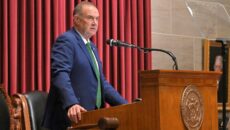JEFFERSON CITY, Mo. — The Missouri Supreme Court has set an execution date for Walter Barton, who was found guilty of first degree murder in 2006, of May 19.
Barton will be the 90th person to be put to death in Missouri since the U.S. Supreme Court reaffirmed the use of capital punishment in 1976 — and the second under Gov. Mike Parson.
Barton was convicted in the 1991 death of Gladys Kuehler, an 81-year-old woman who managed a mobile home facility near Springfield. Kuehler had been found by friends beaten, sexually assaulted, and stabbed dozens of times, KYTV reported.
It took several tries before Barton was ultimately convicted in 2006. Earlier trials were overturned on appeals or mistrials were declared. His lawyer has maintained his innocence.
Missouri’s capital punishment law
Missouri allows the death penalty — by lethal injection or gas — which is overseen by the Department of Corrections. The death penalty can be imposed on invidiuals who are at least 18 years old and found to have deliberately committed first-degree murder, a class A felony.
The law instructs jurors to consider certain evidence, including the perpetrator’s past record, when considering the death penalty.
Individuals who are found to have a mental disease or inability to “understand the nature and purpose of the punishment about to be imposed upon him or matters in extenuation, arguments for clemency or reasons why the sentence should not be carried out,” should not be executed, according to state law.
Death sentence history in the state
There are about two dozen capital punishment offenders in Missouri, according to a Department of Corrections spokeswoman. All are men.
Since the U.S. Supreme Court ruled the death penalty did not violate the Eighth or Fourteenth Amendments, Missouri has executed 89 people. But since capital punishment was first issued in the state (in 1810), Missouri has put to death hundreds of people, according to the Death Penalty Information Center (DPIC).
In fact, the state executed 285 people from 1810 until 1965, according to the DPIC. Until 1936, when the state began to use lethal gas, Missouri hanged those who were sentenced to death. Lethal injections began to be used in 1987.
Only one woman has been executed in Missouri history: Bonnie Heady. Along with her boyfriend, Heady was convicted of kidnapping and killing a young boy in 1953. The pair was executed together in December of that same year.
The last person to be executed by the state was Russell Bucklew, a man convicted of first-degree murder in 1997. Despite two decades of appeals, Bucklew became the 89th person to be put to death in October 2019 — and the first under Parson.
Bucklew had appealed just how he would be sentenced to death. He said because of a rare medical condition, a lethal injection could cause a tumor in his throat to burst, thus causing extreme pain. The U.S. Supreme Court dismissed his argument in a 5-4 ruling in April.
Legislative reforms
A few bills modifying Missouri’s death penalty guidelines were brought up during the 2019 session — but none made it very far. This year, the legislature is considering:
- SB 635 from Republican state Sen. Paul Wieland would repeal the death penalty and change the sentence for anyone who was sentenced to death before Aug. 28, 2020 to life in prison without parole.
- HB 1756 from Republican state Rep. Tom Hannegan would prevent someone from being sentenced to death if he or she is found to have suffered from a serious mental illness at the time of the offense.
- HB 1277 from Democratic state Rep. Sarah Unsicker would abolish the death penalty.
- HB 2450 from Republican state Rep. Tom Hurst would repeal the death penalty.
- HB 2394 from Democratic state Rep. Ian Mackey would change the assessment for first degree murder punishments as it relates to the death penalty.
This story has been updated.

Kaitlyn Schallhorn was the editor in chief of The Missouri Times from 2020-2022. She joined the newspaper in early 2019 after working as a reporter for Fox News in New York City.
Throughout her career, Kaitlyn has covered political campaigns across the U.S., including the 2016 presidential election, and humanitarian aid efforts in Africa and the Middle East.
She is a native of Missouri who studied journalism at Winthrop University in South Carolina. She is also an alumna of the National Journalism Center in Washington, D.C.
Contact Kaitlyn at kaitlyn@themissouritimes.com.
























